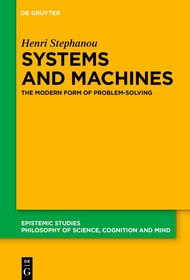
Systems, Machines, and Problem-Solving
The Modern Form of Problem-Solving
Sorozatcím: Epistemic Studies; 55;
-
5% KEDVEZMÉNY?
- A kedvezmény csak az 'Értesítés a kedvenc témákról' hírlevelünk címzettjeinek rendeléseire érvényes.
- Kiadói listaár EUR 139.95
-
58 044 Ft (55 280 Ft + 5% áfa)
Az ár azért becsült, mert a rendelés pillanatában nem lehet pontosan tudni, hogy a beérkezéskor milyen lesz a forint árfolyama az adott termék eredeti devizájához képest. Ha a forint romlana, kissé többet, ha javulna, kissé kevesebbet kell majd fizetnie.
- Kedvezmény(ek) 5% (cc. 2 902 Ft off)
- Kedvezményes ár 55 142 Ft (52 516 Ft + 5% áfa)
Iratkozzon fel most és részesüljön kedvezőbb árainkból!
Feliratkozom
58 044 Ft

Beszerezhetőség
Még nem jelent meg, de rendelhető. A megjelenéstől számított néhány héten belül megérkezik.
Why don't you give exact delivery time?
A beszerzés időigényét az eddigi tapasztalatokra alapozva adjuk meg. Azért becsült, mert a terméket külföldről hozzuk be, így a kiadó kiszolgálásának pillanatnyi gyorsaságától is függ. A megadottnál gyorsabb és lassabb szállítás is elképzelhető, de mindent megteszünk, hogy Ön a lehető leghamarabb jusson hozzá a termékhez.
A termék adatai:
- Kiadás sorszáma 1
- Kiadó De Gruyter
- Megjelenés dátuma 2025. október 20.
- ISBN 9783111492575
- Kötéstípus Keménykötés
- Terjedelem386 oldal
- Méret 230x155 mm
- Súly 500 g
- Nyelv angol
- Illusztrációk 4 Illustrations, black & white; 10 Illustrations, color; 2 Tables, black & white 700
Kategóriák
Rövid leírás:
This series is devoted to publishing books in the fields of epistemology, philosophy of mind, philosophy of language, and philosophy of science. It is an outstanding platform for state of the art contributions. The studies are carried out in an argumentative style and advance current debates in a significant manner. While the main publication language is English, we also welcome German language submissions. All books are peer-reviewed.
TöbbHosszú leírás:
The notion of problem solving has become central to science education and the cognitive sciences, but it is still peripheral to many philosophies of knowledge and science. In fact, the term only became popular in the course of the twentieth century, as humanity’s ability to solve theoretical and practical problems grew at a seemingly exponential rate. This book questions both the nature of problem solving and its effectiveness in transforming our human practices. We argue that this is linked to the idea that some of our enquiries can be summarized in systematic procedures. Examples are the proof of a theorem within an axiomatic theory, a production line within an industrial factory, or an administrative procedure within a bureaucratic system. Although such a form has been common in mathematics since antiquity, it was only in modern times that the possibility of being systematic in the natural sciences and technical disciplines was discovered. The emergence of the modern concepts of system and machine was key to this expansion and to the scientific, industrial and digital revolutions. Problem solving thus appears as the fundamental form of the modern concept of knowledge.
Több





